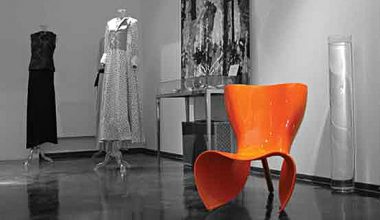Musings from Bahraini entrepreneur, design agency creative director and magazine editor, Wafa Alobaidat
 We all remember when we were 18. When we had home cooked food every day, enjoyed family Fridays, and were driven to the hair salon by the driver (or someone other than ourselves). When our parents plucked us from our golden nests in our warm countries and sent us to cooler climates to continue our education. We also remember, those few weeks after graduation, when we embarked on a new chapter of our lives: University.
We all remember when we were 18. When we had home cooked food every day, enjoyed family Fridays, and were driven to the hair salon by the driver (or someone other than ourselves). When our parents plucked us from our golden nests in our warm countries and sent us to cooler climates to continue our education. We also remember, those few weeks after graduation, when we embarked on a new chapter of our lives: University.
Looking back, no one tells you how harsh it really is, to start over at such a young age in a foreign place, where you have to cook, clean, make new friends and adjust to new weather.
The advice we all get is: be strong, be independent, get good grades, and don't spend too much money. It is a toughie, and we are forced to live under hard emotional conditions. But, more or less, we do. We make do at the end of each month when we're broke, living on tuna biryani or whatever it is we have lying around in our kitchen. We Skype our loved ones, and most importantly, we perform at the best level that we can at school, competing with over-achievers from China, Japan, and (in my case) the UK.
What I find a tad ironic, is that in those 4 to 5 years, we develop our true personalities, learn to make fast decisions, sacrifice shopping sprees and big dinners in order to budget ourselves, and make choices about who to befriend and who to stay away from. We get a crash course on being grown ups, and like pigeons with puffy chests, we parade this newfound independence proud of overcoming harsh times and coming out the other end alive and kicking. We gloat about who we've met and how well we are doing in our courses and how quickly we have adapted to living in first world countries.
Four years later, come graduation time, it is time for us to pack up our precious apartment or dorm room belongings. We can pack up to 40 boxes worth of personal belongings and while doing so we face the harsh reality; the time has come to head back to the homeland. Unlike westerners, we Arabs come back to live with our parents again.
The culture shock I'm about to talk about is not when we leave our homes and live in a new unfamiliar region. Our first form of culture shock comes from our parents, who after inserting us into a different environment expecting us to succeed immediately, start treating us like 18 year olds again once we're back.
"Where are you going?"
"What time will you be home?"
"Who are you going out with?"
"Be careful on the roads."
"Why don't you spend any time home anymore?"
It is delightfully shocking to find that after we have flown away and learned to live on our own, all of a sudden our parents want the control back. You've had your fun. Now come back, and go back to the way you were. It's like all that personality development has gone down the drain. All that confidence we built up slowly starts to crumble away.
We all deal with this sort of culture shock in different ways. Many of us argue, pick a fight, or become stubborn when we feel attacked, protecting our newfound independence. We declare non-acceptance of this negative backward motion of our lives. I mean, here you were, telling us to go full steam ahead and all of a sudden we have to check in and check out with you like we work in a factory.
It takes a while to adjust to this new chapter of our lives, but I have learned to give my parents some boundaries, and eventually (took about a year) they learned to calm down and get adjusted to my new ways.
I discovered a few tips that worked with my parents, back when I was trying to readjust to life in Bahrain, which might benefit newcomers to the region.
- Move slowly. Parents don't like change. When they see you running around like a headless chicken, they think you are being reckless. The slower you move around them, literally, the calmer they feel.
- Ignorance is bliss. Do not shock them by oversharing; my parents seem calmer the less they know about the nitty gritty chatter of my work and personal life.
- Adapt to their system. Figure out what they like and do it, so they are flexible in other areas of your life. Do they like it when you call them to check up on them? Do that. Do they prefer if you spent two nights watching TV by their side? Do that.
- Do not argue, be submissive. Lose the battle with them but win the war with yourself. The less defensive you are and the less you answer back, the more easygoing they become. Sometimes, our parents just want to feel like they are superior and that they have the final say in everything. Usually a good 'inshallah' gets you out of everything.
- Remain calm. And cool and collected. They will eventually mirror this. No matter what, remain calm.
With all that said, others may not have this issue, and will transition well at home if given space to roam and make their own decisions. But the culture shock filters into the rest of daily activity and human interaction. It takes a while to transition to 'Local Ville' and even more challenging to maintain those positive qualities you picked up from your time abroad. The trick is to balance it out.
Wafa Alobaidat writes a bi-monthly column for Khaleejesque and muses on fashion, art, culture and culture shock in the Middle East. Wafa is also the editor of Sketchbook magazine and runs design and PR agency Obai and Hill.
To get in touch with Wafa, email her at wafa@obaiandhill.com or follow her on Twitter @fashionambition







